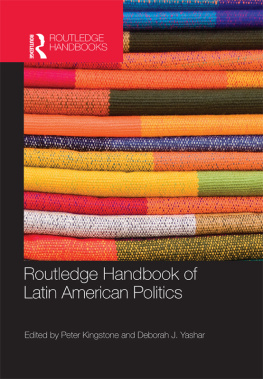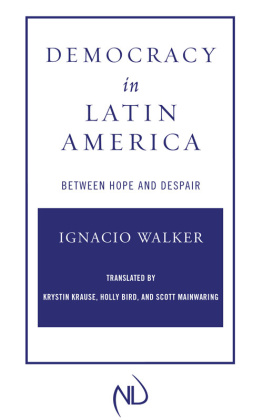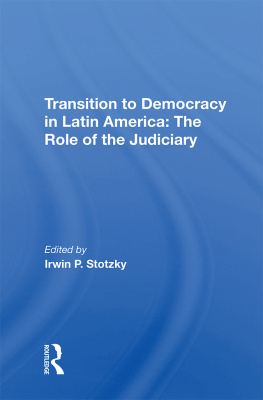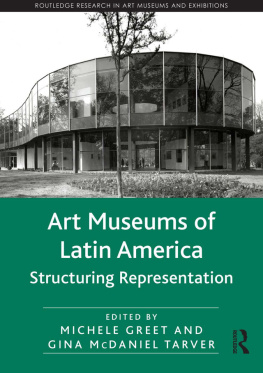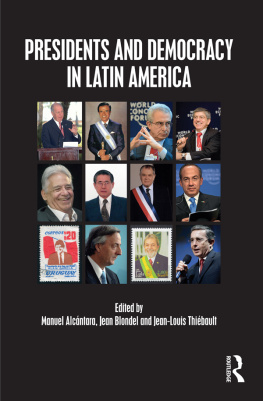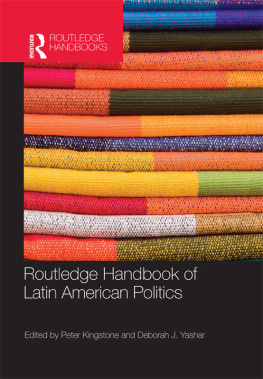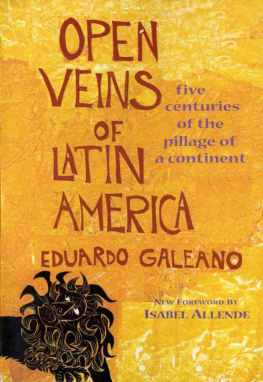1
THE ORIGINS AND DURABILITY OF DEMOCRACY
Gerardo L. Munck
The option between democracy and its alternatives has been a central axis of political conflicts in Latin America since the early twentieth century. A prelude to these conflicts was the process of state formation, which occupied the center stage of political life in the wake of the attainment of independence by Latin American countries roughly 200 years ago. But, inasmuch as the process of state formation resulted in a recognized center of political power and hence a semblance of political order, the struggle between forces in favor and opposed to subjecting political power to democratic control moved to the fore.
The history of the struggle over democracy in Latin America is relatively long and varied. The most vivid manifestations of this struggle were the waves of democratization and de-democratization, that is, fluctuations toward and away from democracy, that swept the region after World War II, and that involved a long period of harsh authoritarian rule in the 1960s and 1970s and the transitions to democracy of the 1980s and 1990s. Thereafter, a new, extremely positive phase was opened. Fears of a return to authoritarianism proved to be unwarranted and democracy gradually assumed the status of a regional norm. Indeed, an unequivocal fact of Latin American political life in the twenty-first century is that never before have so many countries in the region been democratic for so long.
It would be a mistake, nonetheless, to assume that the struggle over democracy can be taken as a settled matter. Analyses of Latin American politics in the twenty-first century can legitimately address the functioning of democracy, as has been standard in the study of the established democracies in wealthy countries. But current politics in Latin America cannot be reduced to conflicts that occur entirely within the institutional rules of democracy, as though conflicts about such rules had ceased to be relevant. Rather, as keen observers of current Latin American politics insist, the struggle over democracy continues to simmer beneath the surface and occasionally erupts into overt political conflict. In other words, the history of democracy continues to unfold.
This chapter offers an overview of the scholarship that has addressed the struggle over democracy in Latin America. The first section locates the study of Latin American politics within the broader disciplinary field of comparative politics, traces the origins of a research agenda centrally concerned with political regimes and democracy in Latin America, and identifies the key characteristics of this agenda. The second and the longest section focuses on the main explanatory theories and debates about the origins and demise of democracy understood as a type of political regime, discusses theoretical ideas and critiques, and summarizes the findings of empirical research. Finally, the third section turns to the frontiers of current research on democracy in Latin America and identifies some challenges concerning old questions tied to a minimalist definition of democracy and new questions that address other aspects of democracy.
1. A Research Agenda on Regimes and Democracy in Latin America
Latin American politics was rarely studied in comparative politics, the academic field within political science dedicated to the study of politics around the world, during the foundational period of this field in the early part of the twentieth century. This can be seen clearly in the classic works on comparative politics of the 1920s and 1930s, such as James Bryces Modern Democracies (1921), Herman Finers Theory and Practice of Modern Government (1932) and Carl Friedrichs Constitutional Government and Politics (1937). These texts invariably focused on the United States, the United Kingdom, France and Germany, in some cases with side-glances to Canada and Australasia and an occasional reference to Russia. In contrast, even in the work of Bryce, one of the few established authors who had actually traveled to South America, the twenty countries of Latin America entered into the analysis brieflyreceiving attention for twenty-one pages of a massive 1,117 page work (Bryce 1921: Vol. 1, Ch. 17)and essentially as contrast cases, that is, as cases where the conditions for democracy found in the better known cases were lacking (Bryce 1921: Vol. 1, 188). Before World War II, comparative politics was a relatively parochial affair.
The status of the study of Latin American politics, and the empirical scope of comparative politics, changed considerably as a result of the new literature on modernization and dependency in the 1950s and 1960s. The modernization literature brought in Latin America, as well as Asia and Africa, to mainstream debates in comparative politics. And, in an even more significant break with prior patterns, thinking about Latin America during this period began to be shaped by authors who were based in the regionthese authors were mainly sociologists, as political science was practically nonexistent in Latin America at the timewho had a closer knowledge about Latin American politics than their U.S. counterparts, and who offered an alternative to the perspective on Latin American politics offered by the modernization literature.
The differences between modernization theory and its alternatives were quite notable.politics in the United States from a parochial affair to an enterprise of global scope and to boost the study of Latin American politics.
The real takeoff in the study of Latin American politics, which firmly established it as part of comparative politics, occurred in the 1970s however, in large part spurred by the work of the Argentine and Yale-trained political scientist Guillermo ODonnell (1973) on the breakdown of democracy in South America. ODonnells work triggered a lively exchange between U.S. authors who studied Latin America and Latin American authors (Collier 1979), setting an example of scholarly collaboration between North and South that transformed the way knowledge about Latin American politics was produced. Moreover, ODonnells work and the discussion about it was seminal in that it gave impetus to a new research agenda focused on Latin American political regimes and democracy that has been sustained over the past four decades.
This agenda of research has been wide ranging and has been fueled by the contributions of a large number of scholars. Thus, it is hard to characterize. But, as a point of entry into this research agenda, three features deserve highlighting. First, this research agenda has been firmly driven by a concern with understanding Latin American politics in its own terms and has been driven in large part by the desire to make sense of the evolving turns of Latin American politics. In broad strokes, this agenda has centered on the problem of the breakdown of democracy during the 1970s, the transition to democracy in the 1980s, the consolidation of democracy in the 1990s, and the quality of democracy in the 2000s. In other words, the central motivation for this research agenda has been the desire to understand Latin American political realities and the main forms that the democratic question has assumed in the past decades.
Second, even though scholars working on this agenda have shown an ongoing concern with matters of conceptualization and engaged in conceptual debatesthese matters are particularly salient in current research on the quality of democracythey have also managed to develop considerable agreement on many basic conceptual issues. Specifically, rather than take the macro dimensions of politics as a constant and focusing only on variations within a given political regime or within democracies, as in common in much research in the field of comparative politics, these scholars share an interest in variations at a macro level related to the political regimes and the democraticness of Latin American countries. Moreover, they have largely converged on a conceptualization of political regimes in terms of the procedures regulating access to the highest political offices in a country and of democracy as, at the very least, a type of regime characterized by mass suffrage and electoral contestation (Dahl 1971; Mazzuca 2007).

